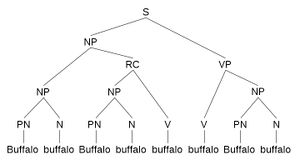User:Simon/Affirmative Generator: Difference between revisions
No edit summary |
|||
| Line 5: | Line 5: | ||
[[File:Buffalo sentence 1 parse tree.jpg|frameless|left]]<br> | [[File:Buffalo sentence 1 parse tree.jpg|frameless|left]]<br> | ||
This sentence demonstrates the productive power of language in both its components and thing that are omitted in the form of the sentence, but retained in the mind of the listener. The argument is that the sentence can be parsed by analyising its structure. In effect, this means that | This sentence demonstrates the productive power of language in both its components and thing that are omitted in the form of the sentence, but retained in the mind of the listener. The argument is that the sentence can be parsed by analyising its structure. In effect, this means that<br> | ||
Buffalo buffalo (Bufalo that are from the town of Buffalo) | Buffalo buffalo (Bufalo that are from the town of Buffalo) | ||
Revision as of 22:21, 15 October 2018
Affirmative Generator
Based on the power of having P.M.A (Positive Mental Attitude), this is a generator for making affirmations to print and display in the work space. Its use is not limited to this space, but this is taken as a departure point for testing. The Affirmative Generator (AF) is a tool that takes from a selection of words within a key syntax - a template for this is the famous "Buffalo buffalo Buffalo buffalo buffalo buffalo Buffalo buffalo" sentence presented by Dmitri Borgmann in Beyond Language: Adventures in Word and Thought in 1967. These sentences introduce the idea of syntactic ambiguity - by which a sentence may be interpreted in more than one way due to its ambiguity.
This sentence demonstrates the productive power of language in both its components and thing that are omitted in the form of the sentence, but retained in the mind of the listener. The argument is that the sentence can be parsed by analyising its structure. In effect, this means that
Buffalo buffalo (Bufalo that are from the town of Buffalo)
buffalo (a verb, meaning to harrass or bother) ... those which
Bufallo buffalo (same as first line)

